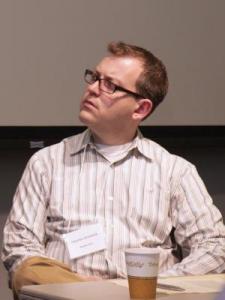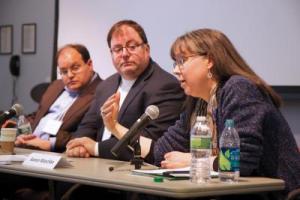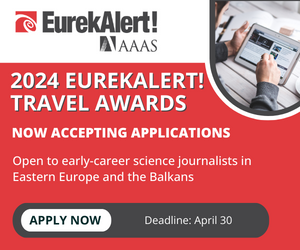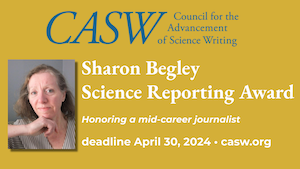By Joe Bonner
For the last several years, Science Writers in New York (SWINY) has organized a party in February celebrating the life of a famous February-born scientist or science-related noteworthy individual. In 2011, the honor went to George W.G. Ferris, the American engineer whose childhood fascination with a water wheel near his rural home inspired him to design and build the contraption that bears his name to carry people up into the air and back.
However unlikely it seems, a party honoring the inventor of an amusement park ride became fertile ground for the germination of an application for an NASW Idea Grant to fund a day-long workshop of bioethics for science journalists.
At the February Ferris fete, the topic of bioethics and science journalism came up in a casual conversation on the second floor of Union Square restaurant Friend of a Farmer. Previously, Mary Crowley, director of communications at The Hastings Center, a nonpartisan research institute dedicated to bioethics and the public interest, had brought up the idea with SWINY. This time, the recently announced NASW Idea Grants helped push the idea to the next level.
An ad hoc committee of SWINY board members Beth Schachter, Carol Milano, and Peggy Crane, SWINY co-chair David Levine, SWINY member Mary Crowley, and Michael Turton, communications associate at Hastings, began the task of drafting a grant application.
“It was laboriously crafted in endless back-and-forth emails among the SWINY committee, then vetted by Mary on every go-round,” says Milano.
Event planning was concurrently underway, with board members including Alan Brown, Sheila Haas, and Alla Katsnelson actively involved in different phases. Top priority was the search for a location within our budget and accessible by public transportation. In New York City, the latter is easily obtained, but the former can be nearly impossible. Schachter contacted Emily Laber-Warren, director of the Health and Science Reporting Program at the CUNY Graduate School of Journalism. Laber-Warren, in turn, received a very enthusiastic response from Judith Watson, associate dean of the graduate school. Milano negotiated the rental fee with the facilities manager, specifically including A/V services. Budget requirements were met, and the agreed-ups terms put in writing.
The grant was written, approved by SWINY and The Hastings Center, and submitted to NASW in August 2011. Then we waited. Months passed. The grant specified a November 2011 event. As that date approached, SWINY asked its co-sponsor CUNY for a new date in March 2012. In late December, grant approval was received, and the committee went full throttle in securing speakers and moderators. Response to the Bootcamp announcement was overwhelming with registrations quickly coming in.
Meanwhile, we learned that when dealing with a large institution one needs to be prepared for the possibility of administrative glitches and obstacles which did occur in dealing with key administrative departments at CUNY. Then one week before the event, Laber-Warren discovered, purely by chance, that the A/V services that we had been told were included in our contract were not! Laber-Warren immediately stepped in to negotiate, schedule, and arrange these services from scratch.
“Without Emily, we would not have had A/V at all,” says Milano.
The only other unexpected surprise along the way was the short-notice cancellation by two of the five editors for the final panel. We were unable to replace them at the last minute. Fortunately, the remaining three were excellent as reflected by highly positive audience feedback.
Overall, attendees gave high marks on the event evaluation questionnaire. So popular were the topics that the only real disappointment expressed was having to choose between the two equally compelling concurrent sessions. Others suggested an even longer event in the future.
“For a first time out, the Bioethics Bootcamp was extremely good,” says Schachter. “What we learned was that added preparation could have made the event much richer and more accessible.” [Translation: Moderators need to keep panelists on time in order to maintain the program schedule.]
NASW funded the event with a $10,000 grant, which was enough to cover expenses, which came to just under $9,900. Lessons learned for next time: A daylong event demands a stunning amount of administrative work and detail.
“This event absolutely required a reliable, persistent, well-organized, highly assertive part-time onsite coordinator,” says Milano. “Appropriate payment for such should be included in the budget for any day-long event.”
“Also, it was difficult finding a company that provides one-day liability insurance, as required by NASW,” notes Milano.
Among the 70 people who attended the event were science and medical reporters and editors, other professional science writers, public information officers, journalism students, and concerned physicians and scientists. Most attendees were NASW or SWINY members, as well as students from CUNY’s Graduate School of Journalism, and NYU’s Science, Health, and Environmental Reporting Program.
A side benefit of the workshop was recruiting new members to SWINY as a result of bootcamp promotion efforts. One of those new members has already volunteered to serve on the SWINY board.
SWINY co-chair Joe Bonner is director of communications and public affairs at Rockefeller University. Bonner managed the Bootcamp’s website presence by creating and maintaining program updates, the registration function, and the event blog. Additional reporting by New York freelance writer Sheila Haas.


.png)

